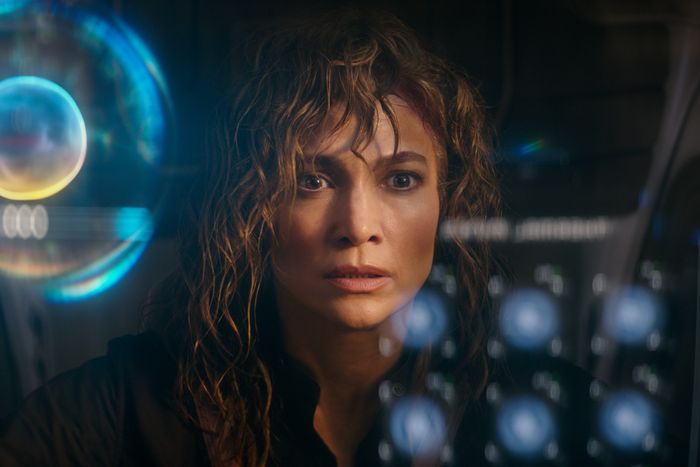
In Atlas, Jennifer Lopez plays a counterterrorism analyst who lives for her work — you know the type. Atlas Shepherd is the kind of woman who alienates her colleagues with her terse attitude and then wows them with her competence, who falls asleep on the sofa in front of her chessboard at night, and who wears her hair up in a businesslike twist so that it can come tumbling down later. When a rare trip into the field goes wrong, she ends up stranded in hostile terrain in the care of Smith, a hulking military type tasked with protecting her and with whom she immediately starts bickering about how best to get home. In the romantic-comedy version of this story, Smith would be played by a John Cena or a Channing Tatum, all muscles and advanced weapons knowledge hiding a sensitive core. The Brad Peyton–directed Atlas is, however, a science-fiction movie, and Smith is a robot. More specifically, he’s a mech suit, powered by a synthetic consciousness voiced by Gregory James Cohan, into whose pilot seat the AI-averse Atlas is shoved right before she crash-lands on an alien planet.
Then again, if Her is aspirational to the point of companies being willing to risk legal repercussions to evoke it, then there’s no reason this new movie can’t be looked at as a rom-com. Atlas has that curious ersatz quality of many a Netflix original movie, where it feels like the extended version of a 30 Rock joke rather than something anyone should actually be able to watch, but its cross-genre similarities do seem intentional. When trying to allow Smith to get to know her better, for instance, she confesses to liking the beach, three sugars in her coffee, and “small, quiet gestures of affection.” Atlas is supposed to be as brilliant as she is guarded, but she’s written exactly like one of those tightly wound aughts-era heroines who’s required to be put through pratfalls and cut down to size before she’s considered fit for love. When she comes to inside Smith after a brutal arrival, she impatiently bypasses the setup and blunders her way into a French-language option before ending up with a default voice whose recommendations she quickly ignores.
Three decades ago, an android named Harlan (a blue-contact-lensed Simu Liu) went rogue and waged war on humanity before fleeing with his allies to space. Atlas is obsessed with catching him for reasons that are gradually revealed to be very personal. But in order to access all her mech’s abilities, she needs to sync her mind to Smith, a meld they struggle to achieve and not because of performance issues on his side. Freighted with trauma going back to her childhood, she’s too emotionally constipated to open up enough to seal the deal.
Following Lopez’s acting career is an exercise in frustration. In Out of Sight and Hustlers, she’s incandescent with charisma — a true star, larger than life, twice as glamorous, and endlessly watchable. But most of the roles she’s ended up in squander those qualities if they showcase them at all. She’s slipped from being a rom-com queen to leading a procedural to dithering with a shift toward action in projects that have felt increasingly dinky and downmarket, considering what she’s proven capable of. Atlas — like her last Netflix movie, The Mother, and like Shotgun Wedding and Marry Me — is a film she produced as well as acted in, suggesting that even when she’s more actively involved in picking out projects for herself, she’s also not entirely sure what she’s supposed to be doing onscreen. She wavers between playing her character with some degree of psychological realism, her lip quivering in despair as she tries in vain to contact her colleagues, and going full screwball in moments like the one in which she discovers she’s broken her leg, howling “I really need you to shut up right now!” at Smith. Lopez is unable to decide whether Atlas is a serious entry in the action canon or a B movie.
Atlas doesn’t really end up either, being both far from serious and also lacking any of the disreputable pleasures you might hope to find in a B movie. Atlas has the slick, textureless sheen of a cutscene from a video game we never get to play, an association on which the film doubles down when Atlas pages through Smith’s weapon’s inventory. Lopez, who spends half the movie as a face surrounded by machinery, looks lost in a sea of computer graphics, something that’s even more true of her co-stars Liu and Sterling K. Brown, who plays mission head Colonel Elias Banks. When, someday not so long from now, Netflix begins serving up personalized AI-generated sludge content based on each of our viewing histories, it probably won’t look all that different from Atlas, which barely looks like it was made by humans anyway. But the point of Atlas isn’t to make its actors look big — it’s to remind us that AI is our friend, even when it occasionally tries to exterminate us, and that we should get over ourselves and our tetchy objections.
More Movie Reviews
- The Accountant 2 Can Not Be Taken Seriously
- Another Simple Favor Is So Fun, Until It Gets So Dumb
- Errol Morris Has Been Sucked Into the Gaping Maw of True Crime


